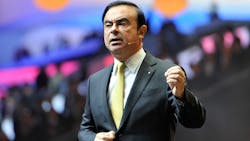Electric cars will fall short of helping the environment without cleaner energy to charge the vehicles’ batteries, said Carlos Ghosn, chief executive officer of Nissan Motor Co. and Renault SA.
“At least the car industry is bringing a breakthrough, which consists in saying that you are going to be transporting yourself from one place to another with zero emissions,” Ghosn said Thursday at an energy conference in Paris. “Now the point is cleaning energy.”
The French-Japanese automaking alliance, which manufactures the best-selling Nissan Leaf electric car, is working to eventually bring out a battery-powered vehicle in China that will be priced at $8,000 or less, before incentives. Volkswagen AG, seeking to recover from its emissions-cheating scandal, is also planning to roll out affordable electric cars in the coming years to push the technology into the mainstream. The success of these efforts largely depends on government incentives to help overcome tepid customer reception, according to Ghosn.
The U.S. said Thursday it’s coordinating an effort to build green highways by establishing 55 corridors for electric-vehicle chargers and hydrogen fueling stations from Maine to Florida and California to New York, laying a groundwork for cleaner interstate travel. The effort is backed with as much as $4.5 billion in loan guarantees for electric vehicle chargers.
Charging Network
“This marks a big step forward in the effort to make EV charging available from coast to coast,” Pasquale Romano, CEO of ChargePoint Inc., said in an e-mailed statement. “This initiative will help make sure that EV drivers can travel anywhere in the country.” The company’s charging network has more than 30,700 independently owned powering stations.
Charging is just one side of the equation. The International Energy Agency estimated in June that countries worldwide will have to invest trillions of dollars in cleaner energy and emissions controls to stem growth in air pollution. French Environment Minister Segolene Royal said at the conference that the country will seek to phase out coal-fired power plants by 2023. In contrast, China, while leading global installations in wind and solar farms in recent years, remains dependent on coal and is looking at electricity exports due to a capacity glut.
The switch to less polluting transport is a strain. Generating cleaner energy profitably is also a challenge, Royal Dutch Shell Plc CEO Ben van Beurden said at the Paris conference.
“Growth of renewables has been remarkable, but capacity of industry to make money in that segment has been remarkably absent,” Van Beurden said.
About the Author
Bloomberg
Licensed content from Bloomberg, copyright 2016.
